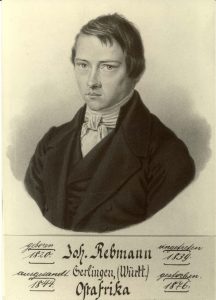
* 16.01.1820 - † 04.10.1876
It is a historical service of Rebmann to impart the geographic science important knowledge about East Africa. He saw himself always and first of all as a missionary. He had understood very early that someone has to stay very long and very patient at one place and to struggle for the people to win people in Africa for the Christian faith. And that is what he did. With endless patience, perseverance and powers of persuasion he christened the first members of the Vanika tribe and started to build a small Christian parish.
In his first years three missionaries worked close together: Dr. Johann Ludwig Krapf, J. Jacob Ehrhardt and Johannes Rebmann - "the famous trio" (Groves). Workers came and left again ... One person only held the position for decades of years - Rebmann.
Rebmann's wife Emma, née. Tyler, died in 1866, after she had stood next to him in his work for 15 years. His only son had died in 1854 a few days after birth. Rebmann's life with lots of success and tragedies took place in Africa, while he stayed in childhood/youth and at the end of his life in Württemberg, Germany.
Johannes Rebmann Foundation would like to put up another memorial to him - and with it also to all the other people from his birthplace who went as missionaries to foreign countries. In Rebmann House Gerlingen you can discover details about Gerlingen's missionaries. You also can order publications.
Life and work:
- Rebmann's life in Gerlingen
- Rebmann as a missionary
- Rebmann's operational area
- Rebmann as a researcher and explorer
- Rebmann's end of life
Documents:
- Letters from Johannes Rebmann
- Curriculum Vitae
- Family tree
- Genealogical tree of the Rebmann family
- Rebmann's map of East Africa
- Rebmann's diary
- Voyage from London to Zanzibar
- Extract of his diary: Discovery of the Kilimanjaro
- Book Steven Paas: Rebmann Biography (in Englisch)
- Reviews:
- on "Anglicans Online"
- in "African Journal of Evangelical Theology" (AJET) - Thesis "Science and mission"
- Presentations by Imanuel Stutzmann: 2003 and 2009
- Presentatons by Dr. Steven Paas in 2011: part 1+2
